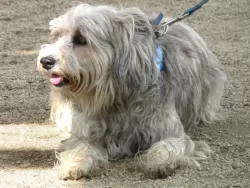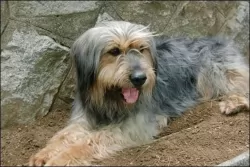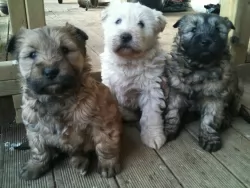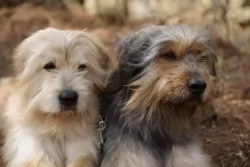 MyDogBreeds
MyDogBreedsSapsali is originated from North Korea but Russian Setter is originated from Russia. Sapsali may grow 8 cm / 3 inches shorter than Russian Setter. Both Sapsali and Russian Setter are having almost same weight. Both Sapsali and Russian Setter has almost same life span. Both Sapsali and Russian Setter has almost same litter size. Both Sapsali and Russian Setter requires Moderate maintenance.
 Early documentation of this dog tells us that it has been around for centuries and is therefore an ancient breed.
Early documentation of this dog tells us that it has been around for centuries and is therefore an ancient breed.
The Sapsali is a dog that comes from Korea and is also known as the Lion Dog, Sapsaree and Sapsal Gae. It is believed that these dogs were used to dispel evil spirits or ghosts.
The dog was given the status as National Treasure by the Korean Government in 1992 and is recognized by a number of local Korean dog societies. The dog isn’t however recognized by any of the major kennel clubs, but is affiliated with the Federation Cynologique Internationale (FCI).
When Korea was under Japanese rule, the dogs were slaughtered to make coats for its military and almost became extinct. Kennels were set up and the dog was revived again in the 1980s.
People often think it is ridiculous that a Setter dog comes from Russia. It is believed that the Russians did have some kind of Griffon and the word Pointer is also often translated as Setter.
It is believed that the Russian Setter is one of the ancestors of the Wire-haired Pointing Griffon and that it possibly shared an ancestry with the German wire-haired and broken-haired pointers.
References to Russian Setters were fairly common in the 19th century, but there is such contradictory information that it is hard to get good information on the dogs. The Russian Setter is believed to have existed before the Russian Revolution resembling the English Setter. Dog experts tell us the dog no longer exists.
 The Sapsali is a medium sized sheepdog standing at between 48 and 60cm in height and weighing between 16 and 27kg. He is a strong looking dog with the coat being long and dense and coming in quite a few color varieties. The coat can be solid in color but it can also be a mixture of blonde, reddish, brown and black. The hair of the dog also falls over the eyes.
The Sapsali is a medium sized sheepdog standing at between 48 and 60cm in height and weighing between 16 and 27kg. He is a strong looking dog with the coat being long and dense and coming in quite a few color varieties. The coat can be solid in color but it can also be a mixture of blonde, reddish, brown and black. The hair of the dog also falls over the eyes.
The dog has large eyes, the ears are also fairly large and the tail is long and held straight or down.
The dog is friendly, social and playful and also loving and loyal towards his human family. He is protective too and makes a good watchdog, but is never aggressive.
He gets on well with children as well as with other dogs. Training and socialization ensure obedience and good behavior and with a desire to please.
They’re intelligent dogs and training is easy. They’re gentle dogs too and this has made them a popular choice for therapy dogs. Their loving natures have been welcomed by patients suffering with trauma and the dog connects strongly with these people.
When back home he wants to be included in all the family activities. He is quite energetic and will require exercise every day – walks, hikes, frisbee, ball and rope games as well as more hectic hikes. He makes a good choice for the first time dog owner but is better suited to life in the suburbs or the countryside as opposed to being on a small property in the city.
In terms of appearance, it was John Henry Walsh who said that the Russian Setter was a dog hidden by its long, woolly matted coat.It seems to have been a medium sized dog with an elegant appearance. It seems the dog came in two varieties - the curly coated liver coated dogs and the fawn colored dogs which are straight coated.
Because there is very little information on these dogs, we assume they were between 57 – 68cm in height and between 27 and 32kg in weight. The coat was no doubt in colours such as grey, reddish-brown with some black and white and shortish and wiry. The ears were floppy,and the face no doubt had some longer hair around the muzzle.
Nobody seems to know exactly what the temperament of this dog was, but when you look at some of his ancestors you can assume that he was strong-willed, confident and a skilled hunter.
He would have required a lot of exercise too. He was lively and energetic. Because he had Pointer in him you can be sure that he would have been intelligent so that he could be trained and socialized.
He would have been keen to learn with an owner who was firm and consistent in his treatment of him. He is a dog most happiest when he can spend time with his human family, a most loyal and devoted family friend, capable of getting on well with children and pets in the home.
 The beautiful Sapsali is a friendly, loving dog breed who is just a little bit wary around strangers.
The beautiful Sapsali is a friendly, loving dog breed who is just a little bit wary around strangers.
If he senses his master is alright around strangers, he will accept them too.
He is both protector and guard dog and gets on well with all members of the household. Apart from the long coat which can be a bit of a handful, this dog ticks all the right boxes in terms of being a most splendid family pet.
It appears, according to records that the Russian Setter has come and gone. However he would have been a calm, gentle pet with running ad hunting keeping him happy. He would therefore have required a lot of exercise.
We can assume that according to the few records that there are, that this was an affable, pleasing dog breed which made a great family pet.
 The Sapsali can live to be between 10 and 12 years of age, being a healthy breed. Like all purebreds, the dog will experience some health concerns, among which are heart disease, obesity, bloat, hip dysplasia and skin problems among others.
The Sapsali can live to be between 10 and 12 years of age, being a healthy breed. Like all purebreds, the dog will experience some health concerns, among which are heart disease, obesity, bloat, hip dysplasia and skin problems among others.
Dogs get heart disease just like human beings. The most common form of heart disease in dogs is valvular disease. Essentially it affects small breed dogs. Heartworm disease and dilated cardiomyopathy are also common forms of heart disease.
Sometimes there are symptoms and sometimes there aren’t, but as heart disease progresses it turns to congestive heart failure – the heart not being able to meet the body’s demands. Signs of this can be fatigue, difficulty with breathing, loss of appetite and weight loss, coughing and a distended abdomen.
If you see these signs, your pet will need to get to the vet. There is no cure for congestive heart failure but there are medications which can help the heart work better.
The Russian Setter had an average lifespan of 10 – 14 which is a fairly good innings for a dog. Nonetheless you would have had to be aware of some common dog problem. These dogs were prone to major health issues such as both hip and elbow dysplasia, deafness, epilepsy and hypothyroidism.
The thyroid glands produce hormones that affect the function of many parts of the body. Dogs with this illness have a low production of thyroid hormones.
This disease is mainly caused by inflammation or shrinkage of the thyroid gland. The most common signs of low thyroid in dogs is thinning of the fur, the coat is dull, there is weight gain and excess shedding. The dog doesn’t tolerate cold well either. These dogs also often have ear infections.
 The Sapsali is covered in thick, long hair and the coat is going to require a lot of attention. It will be better to give the coat a brush every day as the coat can become very matted and tangled. The dog is also a heavy shedder so a regular brush will help to get rid of all that loose hair.
The Sapsali is covered in thick, long hair and the coat is going to require a lot of attention. It will be better to give the coat a brush every day as the coat can become very matted and tangled. The dog is also a heavy shedder so a regular brush will help to get rid of all that loose hair.
The Sapsali will need to have his ears, eyes and teeth regularly checked to ensure they are clear of any infection and to prevent any illnesses. A bad tooth can create many health issues throughout the dog’s body.
You can enhance your dog’s health by giving him good food. Commercially manufactured dog foods can be a good, convenient choice, more so if you choose the high quality ones known for their natural, quality ingredients.
To provide your dog with just a bit of variety in his diet, some home-made food added into the dry kibble from time to time will delight your pet. No need to make preparing the food a huge issue either. Boil brown rice and chicken in a pot and add in sweet potatoes, carrots and spinach.
Chop all this up and as a treat, add smaller portions of it into the dry kibble when you want to treat your dog. To avoid skin infections, try to include some raw meat into his diet occasionally. Never leave your pet without a constant source of fresh, cool water
Whatever kind of coat the Russian Setter ad it would have required a brushing twice a week to keep it in top form.
The medium length floppy ears would have to be checked inside for ear infection.
His owners would have checked inside the mouth for any signs of rotten or bad teeth.
His nails would have required trimming.
Dogs need the best food there is to stay healthy. The Russian Terrier, if it were still around today, would have had the best commercially manufactured food there was.
You want to provide dogs with some good homemade food too. Dogs thrive on simplicity and consistency to avoid upsetting the stomach. Some home-cooked food such as boiled chicken, sweet potatoes, brown rice or pasta, carrots and spinach would be perfect for him. Chop the food up finely and add it into the dry kibble once or twice a week. Raw meat should also be added in when possible to promote good skin health.
Make sure your pet is never without a constant supply of fresh, cool water.